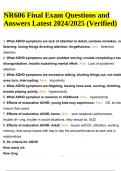1. What ADHD symptoms are lack of attention to detail, careless mistakes, not listening, losing things diverting attention, forgetfulness: Ans- Selective attention 2. What ADHD symptoms are poor problem solving, trouble completing a task, disorganization, trouble sustaining mental effort: Ans- Lack of sustained attention 3. What ADHD symptoms are excessive talking, blurting things out, not waiting ones turn, interrupting: Ans- Impulsivity 4. What ADHD symptoms are fidgeting, leaving ones seat, running, climbing, trouble playing quietly: Ans- Hyperactivity 5. What ADHD symptom is common in childhood: Ans- hyperactivity 6. Effects of maturation ADHD- young kids may experience: Ans- DD, bx less mature than peers 7. Effects of maturation ADHD- teens: Ans- poor academic performance, trouble dri- ving, trouble in social situations, risky sexual bx, SUD 8. Effects of maturation ADHD- Adult: Ans- Issues with EF, attention, working memory, that cause issues with day to day fnx and performance at work and in relationships 9. Dx criteria for ADHD How many s/s How long NR606 Final Exam Questions and Answers Latest 2024/2025 (Verified) How many settings: Pattern of 6 s/s that interfere with fnx/development, 6 months or longer Present in 2 or more settings 10. How to combat anorexia with stimulant use: Take medication with breakfast to decrease anorexia or associated weight loss 11. When patients with ADHD have co morbid MH issues, what do you tx first: ADHD (stimulants first line) Treating ADHD s/s first will give a clearer picture of the comorbidities 12. Work up for starting stimulant: ECG- if personal/first relative fmly hx Check bp/wgt/hgt 13. What co morbidity should the PMHNP assess for before starting a stimu- lant: BPD, CNS stimulant can cause psychotic or manic s/s in pt's with no prior hx or may exacerbate bx disturbances and thought d/o in pt's with pre-exisiting psychosis 14. Stimulants can exacerbate what comorbid dx: anxiety and SUD 15. Increased irritability or insomnia can be tx with what: low dose non stim 16. Abrupt withdrawal from stimulants can cause what: irritability and rebound s/s 17. What to do with tx for ADHD if the pt is argumentative or oppositional: - Combo therapy with stim and non stim 18. Recommendations for parent training in behavior management for ADHD as a first-line Intervention - What do the parents learn: Recommended for child under 6 - Parents learn positive communication and reinforcement, structure, and discipline - Teaches kids to better control their own bx = improved fnx at school, home, and relationships 19. What setting is ODD most common: Home setting with peers or adults that the pt knows 20. What is ODD proceeds: Conduct disorder and ADHD, more common in boys anxiety and depression. Increased risk of SI 21. Dx criteria for ODD: -4 or more symptoms have occurred during an interaction with one or more individuals not including siblings within the last 6 months -Kids under 5 bx occur on most days for at least 6 months 22. ODD s/s: Angry/irritable mood: Loss of temper, easily annoyed, anger and resentment Argumentative/Defiant: Argues with authority figures, actively defiant or refusing to follow rules or requests from authority figure, deliberately annoys others, blames others for their mistakes/misbx Vindictiveness: spiteful or vindictive at least twice within the past 6 months. 23. Hallmark of ODD: Persistent angry irritable mood and defiant bx with vindictive- ness 24. Conduct disorder exhibits lack of: empathy, aggression and impulsivity 25. Severe behaviors violating society norms or rights of others and involved aggression towards others, animals, theft, destruction of property occurring




